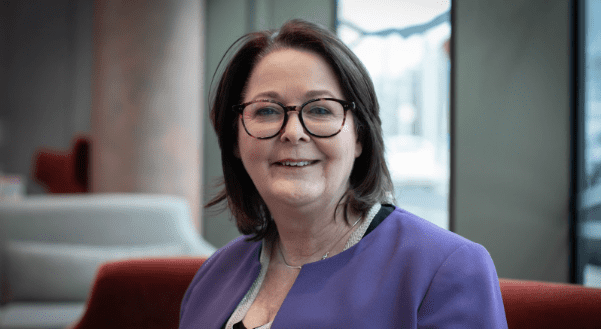Pictured: Margaret Sweeney, CEO, IRES
Margaret Sweeney is the CEO of IRES, the largest provider of private residential accommodation in Ireland
Note: This piece was originally published in Business & Finance magazine, vol. 59, no. 2, available to read, with compliments, here.
“There is no doubt that the rolling waves of crises in the last two years—the pandemic, a strained global supply chain, talent shortages, climate activism as well as the rise of stakeholder capitalism—have created a new set of challenges for corporate leaders”
Margaret Sweeney is the Chief Executive Officer of Irish Residential Properties REIT (IRES), the largest provider of private residential rental accommodation in Ireland. She is a non-executive director of Dalata Hotel Group Plc and holds several other positions including the Chair of Irish Institutional Property and the Chair of the Industry Advisory Board at DCU Business School. With leadership roles as CEO and director in sectors undergoing rapid transformation, we asked Margaret to give her views on what a ‘New Era of Leadership’ means to her.
How has your leadership style evolved over the past few years as the business landscape changed?
“Throughout my career I have sought opportunities to learn and encounter new ideas. As a leader I have always focused on people and made sure that we have the skills in place to deliver strategy all the way through to execution.
I started out as an advisor in KPMG supporting the earliest FDI clients to Ireland but also working with multigenerational family businesses. I’ve had exposure to many industries, including finance, aviation, hospitality, agriculture, and education.
When I think about current behaviour change, digital transformation, the geopolitical environment, and inflation rates not seen since the 1980s, there are some familiar themes. However, we can view today’s events through different lenses, such as ESG, which can drive positive change for people and the planet alongside economic prosperity.
There is no doubt that the rolling waves of crises in the last two years—the pandemic, a strained global supply chain, talent shortages, climate activism as well as the rise of stakeholder capitalism—have created a new set of challenges for corporate leaders.
The additional traits that CEOs need to navigate this environment are agility and the ability to remain calm throughout constantly changing circumstances.”
What works best to keep your team engaged and excited about the future of the business?
“IRES recently changed its structure where all of the Company’s functions are managed internally from our Dublin office. Across our ninety staff, we have people with a broad range of skills and expertise – from our inhouse maintenance tradespeople to our asset managers, all the way through to legal and accounting professionals.
Engaging and aligning our team with our Company’s purpose ensures that we are motivated and confident for the future. As part of our ESG strategy, we have outlined a specific commitment to growing our business by investing in technology and people so that we can deliver good customer service and be a sustainable organisation in the widest sense of the word.
In a country with an undersupply of housing, we believe that by providing high-quality homes and increasing availability, we are positively contributing to an improving rental market and raising the living standard.
For me, the focus is on having a good executive team that collaborates well and is representative of the diverse world that we live in. Diversity of talent – in terms of gender, ethnicity, and background – is an important part of risk management and helps ensure that the strategy that is driving the business is delivering for all our residents and wider stakeholders.
This focus on diversity was recently recognised by European Women on Boards (‘EWOB’) who awarded IRES as a best practice leader in their recent Gender Equality Index report. Of the 668 European STOXX 600 Companies, only 84 companies reached a score of over 0.8 on the EWOB Gender Diversity Index, which considers the share of women in leadership, women on the board, women in executive level and women in committees. We were naturally delighted with this recognition at European level and believe recognition like this enhances engagement with our people.”
How can business leaders prepare for all eventualities – good and bad – that may lie ahead?
“There is no doubt that the ‘plates are shifting’ at the moment, similarly to how they did two years ago at the start of the pandemic.
With the ever-changing market backdrop, businesses need to think critically about their risk appetites and tolerances, in order to manage these effectively. Tone from the top is incredibly important and CEOs need to think strategically and innovatively, with a clear focus on the long-term with every decision. You must also remain agile and be able to pivot operationally as needed – ensuring that you can adapt to any situation or challenges that are presented, while maintaining one focus on long-term business performance.
I have found board experience hugely valuable in keeping ahead of things. It gives me sight of what’s coming down the tracks as some things show up earlier in other industries. It’s also an opportunity to learn from others’ successes and failures and see how risks are managed elsewhere. The engaged but removed perspective of the board generates insights and energy that I can bring back to IRES as we chart the next stage of our evolution.”

